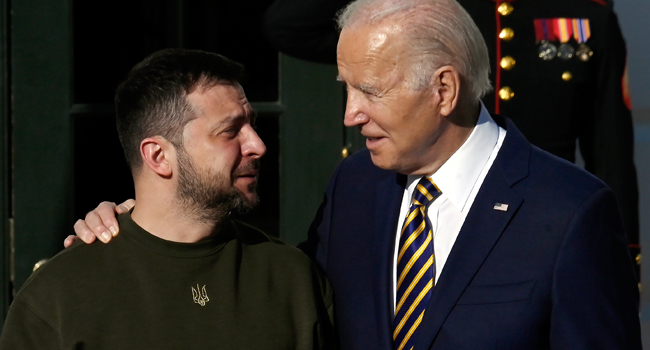US House Reps Speaker said the combined Ukraine-Israel aid package would pass the lower chamber without including a plan for the Mexican border.
After weeks of wrangling, the US Senate has passed a new package of aid for Ukraine and Israel – but the House of Representatives seems unlikely to take it up for a vote, further holding up American aid at a critical point in Ukraine’s fight against Russia.
House Speaker Mike Johnson late Monday sharply criticised the $95.3 billion aid package, just before the Senate passed it by a decisive majority.
Senate leaders and moderates from both parties have been trying to prove that the US remains committed to protecting its allies, and endured marathon speeches from a determined group of hard-right Republican Senators to hold a vote in the early hours of Tuesday.
Pro-aid lawmakers have cast the package as a direct investment in American interests to ensure global stability. As written the bill would allot Ukraine roughly $60 billion (about €55), about a third of which would be spent replenishing the US military’s supplies of weapons and equipment to offset whatever was sent to Kyiv.
But Johnson, a Louisiana Republican, said in a statement that the package lacked security provisions for the US’s border with Mexico, calling it “silent on the most pressing issue facing our country”.
“In the absence of having received any single border policy change from the Senate, the House will have to continue to work its own will on these important matters,” Johnson said.
“America deserves better than the Senate’s status quo.”
It was the latest – and potentially most consequential – sign of opposition to renewed Ukraine aid from conservatives who have for months demanded that border security policy be included in the package, only to last week reject a bipartisan proposal specifically intended to address that exact problem.
The renewed opposition from the right is just the latest example of how the Republican Party’s stance on foreign affairs is being transformed under the influence of Donald Trump, who remains the party’s likely presidential nominee.
The former president has led his party away from the foreign policy doctrines of aggressive American involvement overseas and toward an “America First” isolationism.
Speaking at a campaign rally on Saturday, Trump that he had once told a NATO ally he would encourage Russia “to do whatever the hell they want” to members that are “delinquent” in their financial and military commitments to the alliance.
Hardcore Trumpists in the Senate remained steadfast in their opposition to the package. Senator J.D. Vance, an Ohio Republican, argued that the US should step back from the conflict and help broker an end to the conflict with Russian President Vladimir Putin.
He questioned the wisdom of continuing to fuel Ukraine’s defence when Putin appears committed to continuing the conflict for years.
Conversely, the leadership of the party and many moderate Republican Senators disagree with such ideas, insisting that bowing to Russia is a dangerous move that puts Americans at risk.
In an unusually raw back-and-forth, GOP senators who support the aid challenged some of the bill’s opponents directly on the floor.
The lower chamber
While there are several pro-Ukraine voices in the senior ranks of the Senate Republican leadership, the House party is more firmly aligned with Trump on foreign affairs issues and is deeply skeptical of continuing to aid Ukraine in its war against Russia – this despite international warnings that American assistance is critical for the war effort.
Nonetheless, Senate supporters of the package have been heartened by the fact that despite Mr Johnson’s apparent skepticism, many House Republicans – albeit a minority – do still adamantly want to fund Ukraine’s defence while the war continues.
Congresswoman Abigail Spanberger, a Virginia Democrat, traveled to Kyiv last week with a bipartisan group that included Mike Turner, an Ohio Republican who chairs the House Intelligence Committee, as well as Republicans French Hill and Zach Nunn along with Democrat Jason Crow.
Spanberger explained that the trip underscored to her and her colleagues how Ukraine is still in a fight for its very existence. During a meeting with Ukrainian President Volodymyr Zelenskyy, the delegation tried to offer assurances the American people still stood with his country, she said.
“He was clear that our continued support is critical to their ability to win the war,” Spanberger said. “It’s critical to their own freedom. And importantly, it’s critical to US national security interests.” Euronews


